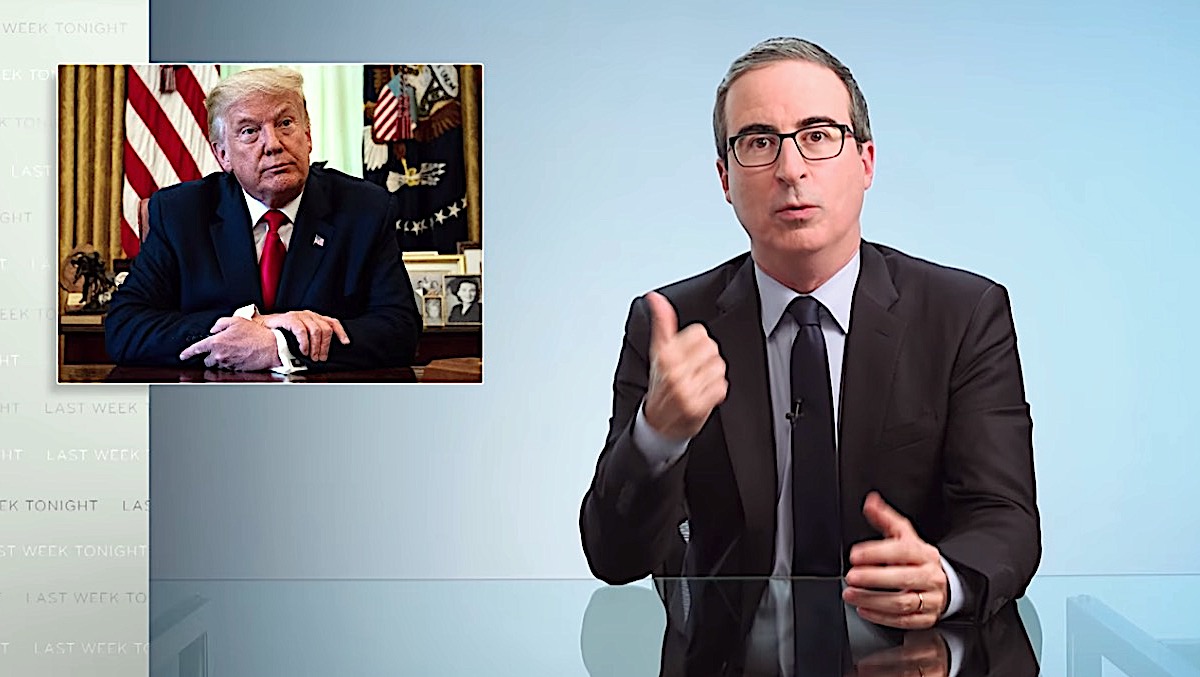John Oliver lays out 'the downside of humoring' Trump's 'pathetic, dangerous' refusal to concede


A free daily email with the biggest news stories of the day – and the best features from TheWeek.com
You are now subscribed
Your newsletter sign-up was successful
The main story on Sunday's season finale of Last Week Tonight "unfortunately, for the second week in a row, concerns the election we just had," John Oliver sighed, and "believe me, I'm just as disappointed as you about that." Normally, "the loser of a presidential election would simply acknowledge that they lost, and the country would get to move on," he said. And while President Trump's refusal to concede isn't that surprising, the public backing of "Trump's indefensible behavior" by top administration officials and Republicans is "disappointing."
"Tonight let's look at just how weak Trump's case for overturning this election is and what real harm 'humoring' him will do," Oliver said. "And let's start with the case itself. Because there are lots of accusations and lawsuits flying around right now. And If you're a casual viewer of right-wing media, you might think, 'Well, there must be something here, they wouldn't be going to all this trouble over nothing.' But the thing is, they are. This really is nothing." He shot down some of the allegations — dead voters, flipped votes — then said he "could spend the rest of this show debunking stories, the problem is, it's endless."
"So the allegations here are complete nonsense, and who knows why Republicans are entertaining this," Oliver said. "What I do know is that the answer to the question, 'What's the downside of humoring him?' is: a lot." Aside from depriving President-elect Joe Biden of a smooth transition, Trump's delusion "also plays into grim fantasies of embattled Trump supporters, something expressed perhaps most dramatically and stupidly by the actor Jon Voight," he said. "Trump is playing a dangerous game here. Because there is a huge difference between 'not my president' and 'not the president.' And to be clear, people who are that angry are not riling themselves up in a vacuum. They've been fed a steady diet of misinformation, bulls--t fraud claims, and a victim narrative" from right-wing media and Trump himself.
The Week
Escape your echo chamber. Get the facts behind the news, plus analysis from multiple perspectives.

Sign up for The Week's Free Newsletters
From our morning news briefing to a weekly Good News Newsletter, get the best of The Week delivered directly to your inbox.
From our morning news briefing to a weekly Good News Newsletter, get the best of The Week delivered directly to your inbox.
"And infuriatingly, Trump has chosen to sow all this chaos around the election despite the fact that deep down, he knows it's over," Oliver said, a situation that "is pathetic, dangerous, and in many ways an appropriate coda to a presidency that has destroyed so many lives" and relationships.

Oliver ended the season awkwardly video-chatting with Adam Driver and literally blowing up 2020.
A free daily email with the biggest news stories of the day – and the best features from TheWeek.com
Peter has worked as a news and culture writer and editor at The Week since the site's launch in 2008. He covers politics, world affairs, religion and cultural currents. His journalism career began as a copy editor at a financial newswire and has included editorial positions at The New York Times Magazine, Facts on File, and Oregon State University.
-
 Quiz of The Week: 14 – 20 February
Quiz of The Week: 14 – 20 FebruaryQuiz Have you been paying attention to The Week’s news?
-
 The Week Unwrapped: Do the Freemasons have too much sway in the police force?
The Week Unwrapped: Do the Freemasons have too much sway in the police force?Podcast Plus, what does the growing popularity of prediction markets mean for the future? And why are UK film and TV workers struggling?
-
 Properties of the week: pretty thatched cottages
Properties of the week: pretty thatched cottagesThe Week Recommends Featuring homes in West Sussex, Dorset and Suffolk
-
 ‘One Battle After Another’ wins Critics Choice honors
‘One Battle After Another’ wins Critics Choice honorsSpeed Read Paul Thomas Anderson’s latest film, which stars Leonardo DiCaprio, won best picture at the 31st Critics Choice Awards
-
 A peek inside Europe’s luxury new sleeper bus
A peek inside Europe’s luxury new sleeper busThe Week Recommends Overnight service with stops across Switzerland and the Netherlands promises a comfortable no-fly adventure
-
 Son arrested over killing of Rob and Michele Reiner
Son arrested over killing of Rob and Michele ReinerSpeed Read Nick, the 32-year-old son of Hollywood director Rob Reiner, has been booked for the murder of his parents
-
 Rob Reiner, wife dead in ‘apparent homicide’
Rob Reiner, wife dead in ‘apparent homicide’speed read The Reiners, found in their Los Angeles home, ‘had injuries consistent with being stabbed’
-
 Hungary’s Krasznahorkai wins Nobel for literature
Hungary’s Krasznahorkai wins Nobel for literatureSpeed Read László Krasznahorkai is the author of acclaimed novels like ‘The Melancholy of Resistance’ and ‘Satantango’
-
 Primatologist Jane Goodall dies at 91
Primatologist Jane Goodall dies at 91Speed Read She rose to fame following her groundbreaking field research with chimpanzees
-
 Florida erases rainbow crosswalk at Pulse nightclub
Florida erases rainbow crosswalk at Pulse nightclubSpeed Read The colorful crosswalk was outside the former LGBTQ nightclub where 49 people were killed in a 2016 shooting
-
 Trump says Smithsonian too focused on slavery's ills
Trump says Smithsonian too focused on slavery's illsSpeed Read The president would prefer the museum to highlight 'success,' 'brightness' and 'the future'
